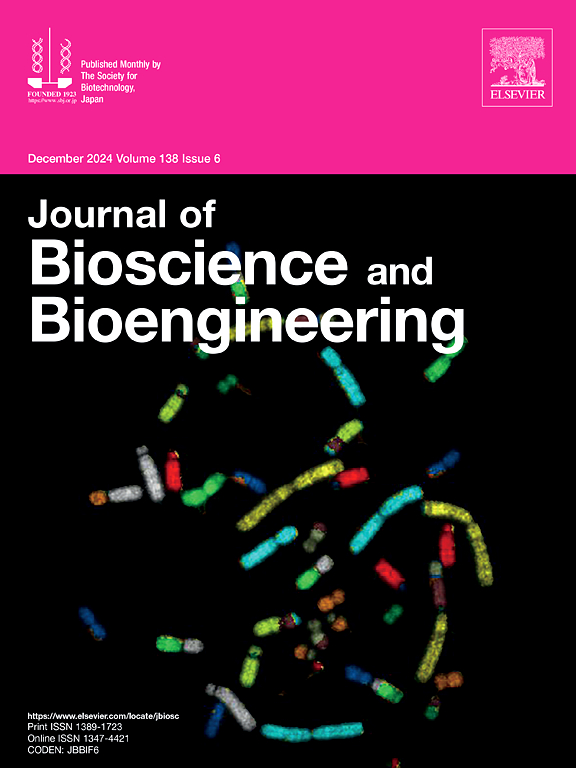Establishment of genome editing techniques in the marine oleaginous diatom Fistulifera solaris for improved oil accumulation
IF 2.9
4区 生物学
Q3 BIOTECHNOLOGY & APPLIED MICROBIOLOGY
引用次数: 0
Abstract
Biofuel production using microalgae has attracted considerable attention owing to high growth rate and lipid accumulation properties. However, further enhancement in lipid productivity is required to render this economically feasible. CRISPR/Cas9, which is one of the powerful genome editing tools, is an essential technique that may solve this problem. The marine diatom Fistulifera solaris JPCC DA0580 is a promising candidate of the biofuel production, since it accumulates significant amount of lipids. However, genome editing techniques have not yet been established for F. solaris, which prevent the construction of valuable strains. In this study, CRISPR/Cas9-mediated specific gene knockout technique was established in F. solaris, through targeting adenine phosphoribosyl transferase gene (apt) and triacylglycerol (TAG) lipase gene (tgl1). Mutations in the target sequence were detected in apt- and tgl1-edited mutants. Moreover, the mutants showed distinct phenotypes, such as suppression of TAG degradation and resistance to 2-fluoroadenine. These results indicate the successful demonstration of CRISPR/Cas9-mediated genome editing in the oleaginous marine diatom F. solaris. Furthermore, oil degradation was successfully suppressed by knocking-out tgl1. The CRISPR/Cas9-mediated genome editing established in this study provides key molecular tools for both the basic biology and the future biotechnological applications of F. solaris, such as biofuel production.
海洋产油硅藻fisstulifera solaris基因组编辑技术的建立,以改善油脂积累。
利用微藻生产生物燃料因其高生长速度和油脂积累特性而受到广泛关注。然而,需要进一步提高脂质生产力,使其在经济上可行。CRISPR/Cas9是一种强大的基因组编辑工具,是解决这一问题的关键技术。海洋硅藻Fistulifera solaris JPCC DA0580是一种很有前途的生物燃料生产候选者,因为它积累了大量的脂质。然而,目前还没有针对solaris的基因组编辑技术,这阻碍了有价值菌株的构建。本研究通过靶向腺嘌呤磷酸核糖转移酶基因(apt)和三酰基甘油(TAG)脂肪酶基因(tgl1),建立了CRISPR/ cas9介导的solaris特异性基因敲除技术。在apt-和tgl1编辑的突变体中检测到靶序列的突变。此外,突变体表现出不同的表型,如抑制TAG降解和对2-氟腺嘌呤的抗性。这些结果表明,CRISPR/ cas9介导的基因组编辑在产油的海洋硅藻F. solaris中得到了成功的验证。此外,通过敲除tgl1成功抑制了原油降解。本研究建立的CRISPR/ cas9介导的基因组编辑为solaris的基础生物学和未来生物技术应用(如生物燃料生产)提供了关键的分子工具。
本文章由计算机程序翻译,如有差异,请以英文原文为准。
求助全文
约1分钟内获得全文
求助全文
来源期刊

Journal of bioscience and bioengineering
生物-生物工程与应用微生物
CiteScore
5.90
自引率
3.60%
发文量
144
审稿时长
51 days
期刊介绍:
The Journal of Bioscience and Bioengineering is a research journal publishing original full-length research papers, reviews, and Letters to the Editor. The Journal is devoted to the advancement and dissemination of knowledge concerning fermentation technology, biochemical engineering, food technology and microbiology.
 求助内容:
求助内容: 应助结果提醒方式:
应助结果提醒方式:


